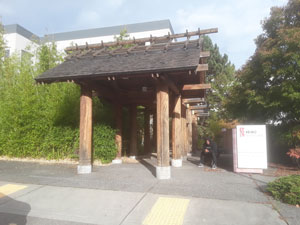On Thursday, September 17, Africatown Community Home at Keiro held the first of three weekly community Zoom meetings. The meeting was attended by more than 60 people, including about ten staff and 12 from the Japanese American community.
The main points were as follows:
The Seattle Keiro building will re-open its doors as a men’s homeless shelter, around mid-October.
The facility will be managed by Africatown Community Land Trust (ACLThttps://www.africatownlandtrust.org/). Their president and CEO is K. Wyking Garrett, a third-generation resident of the Central District. His vision is that of Seattle as a world-class “inclusive” city.
Background
The Keiro property was first sold to a Bellevue-based developer who planned to build 285 units of market-rate housing. This would have added to the displacement of many long-term neighborhood residents through increasing property values.
As there was growing community interest in the property, it was re-offered for sale at $13 million. At that point, the Africatown community mobilized, raised the money, and acquired the building, with negotations for purchasing it ongoing.
Context
There were 11,751 homeless in Seattle/King County as of January 2020 (King Co. data). Of these, 56 percent were men. The racial breakdown was 48% white (from a resident population of 56%) and 25% black (from 7%). Thus, black homeless are disproportionately represented. More broadly, there are more homeless now than then, as many former group shelters closed their doors owing to the COVID-19 pandemic, and tearing down of old buildings for new construction has continued.
The Project
The Community Home at Keiro will be “full service” for 150 residents, with a slow ramp-up to March 2022 anticipated. It will be a 24/7 facility run by “best practices.” These will include showers and laundry, meals (breakfast and dinner), day service, case managers, employment resources, and transitions to permanent housing. It is city funded.
Garrett emphasizes that it is not only a project run by and for African Americans. While ACLT will be the sole operator, a consortium of parties is providing supportive consulting, including the Salvation Army, Compass Housing, the City of Seattle, and the King County Homeless Authority.
Issues
JA-community concerns about the project are numerous, mainly public safety and sanitation in the historically Black and JA neighborhood where many JA institutions visited by the elderly remain.
Tomio Moriguchi, former founder of Keiro Nursing Home comments in his letter to the City of Seattle: “In addition, the City is encouraging this much needed program that will be tailored to meet the specific cultural needs of the black community, even though this proposed shelter is to be located in the midst of a traditional Asian and Japanese community which was lived and owned property there since the early 1900’s. A community where 30% of its residences were incarcerated without due process in 1942. A community with many Asian churches, a long-standing Japanese Martial arts center, and many other social and Asian cultural programs. Also an unaddressed great concern for the safety of over 250 Senior residents of Midori, Wisteria and Kawabe housing in the neighborhood.”
Locals have also been disappointed with how other homeless-aid organizations have been run to date, including the Navigation Center at 12th Avenue South and South Weller, and a tiny-house village at 18th and Yesler. These have been magnets for nearby street camping, drug use, and litter including used needles, gallon jugs of urine, and human feces. One asked if the city is disproportionately dumping its problems on the International District and Central Area. (It is helping similar projects on Capitol Hill.)
JA attendees also disliked the “quiet” manner in which this project was developed. Only a few news articles have been written on it, notably in the “Northwest Asian Weekly.”
Opposing opinion: Letter to City of Seattle from co-founder of the former Keiro Nursing Home, Tomio Moriguchi: Regarding City of Seattle funding for the proposed enhanced shelter to be operated by Africatown at the former Keiro Nursing Home site (napost.com)
The Positives
To the project’s credit, it prevented demolition of the historic Keiro Building by the Bellevue developers. This process is always environmentally wasteful for not-yet-old buildings. Second, it attacks head-on the problems of homelessness in Seattle and inequities in Black access to housing and jobs, which all can agree are major problems. Third, it offers a key advantage over other homeless-aid organizations: as Africatown is minority-run, it involves community service by people who look like many of the people they will be helping. In this way, the project has great potential to reduce the “we care” credibility gap that prevents clients from accepting help and moving in.
Garrett: “You don’t see African Americans in the homelessness business, receiving and controlling the resources to address the problem.”
In short, Africatown Community Home at Keiro is a new local nonprofit doing “what has never been done before.” Notably, the project anticipates posting some 33 job positions on Indeed.com, many of which are likely to be filled by people of color.
Lastly, to Africatown’s credit is the respectful manner and spirit in which this first public meeting was held. Blacks, City of Seattle employees, and Asian Americans were all present. There were no raised voices.
The Present
As the project is already a “done deal,” the current focus shifts to making the project work for everyone.
One supportive JA voice: While it is sad that we lost Keiro, it is good that a community organization bought it.
Stan Shikuma: “We have a chance here to really make a change.”
Ann Kumasaka: “Trust the process. Know that there is no quick fix, and that we will struggle together.”
The two remaining Zoom meetings will be followed by an in-person Open House:
Community Home at Keiro
Third Zoom meeting:
Tactics and Solutions: Thu Sep 30, 6-8 p.m.
Open House, Thu Oct 14, 1 – 4 p.m.
Registration: https://bit.ly/3E5j7B5
Contact: Kevin Mundt, a human services manager for the city, also provided his email for correspondence related to the project: kevin.mundt@seattle.gov.








